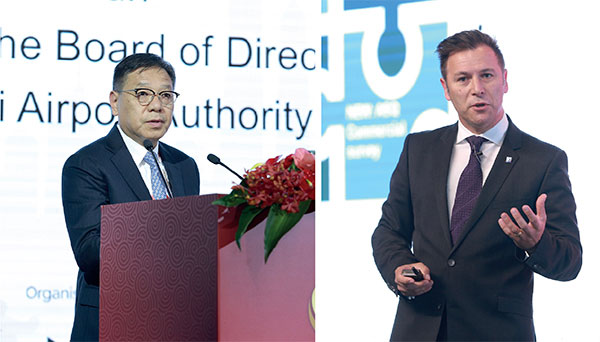ACI World’s last big event of 2018, The Trinity Forum, attracted over 500 delegates to Shanghai to address the theme of ‘The changing airport and travel retail commercial eco-system’.
The annual event brings together airports, concessionaires and brands to improve the understanding between these three crucial sectors and help the industry confront challenges, and seize opportunities, in the airport retail business for the benefit of the travelling consumer.
And, as usual, it didn’t disappoint with ACI World director general, Angela Gittens; Shanghai Airport Authority’s chairman of the board of directors, Yun Qin; Groupe ADP’s customer division director, Mathieu Daubert; and Sydney Airport’s general manager for retail, Glyn Williams, just a few of the impressive line-up of speakers to take the stage in the opening sessions of the event held at the grand Jing An Shangri-La Hotel in Shanghai.
Moodie Davitt Report founder and chairman, Martin Moodie, got proceedings underway with a heartfelt tribute to the late King Power International Group chairman, Vichai Srivaddhanaprabha, before going on to talk about the growing importance of China to travel retail, calling it the “epicentre” of the sector.
He also touched on the challenges and opportunities facing travel retail, stating that if the industry is able to adapt to the changing eco-system and can convert footfall into sales, the future looks bright.
“Mankind will continue to travel in ever greater numbers, and if our industry can aspire to deliver its unique combination of great brands, great food in great amphitheatres with great experiences, then the future is positive,” Moodie enthused.
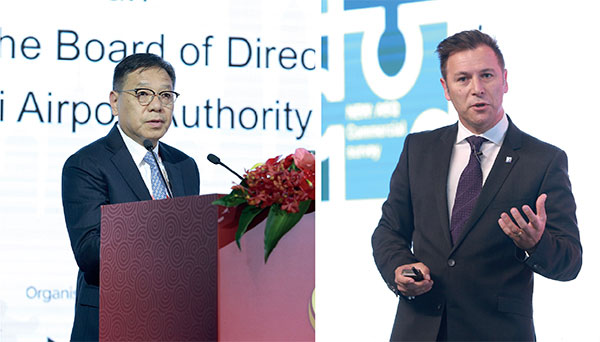
He was followed by ACI World’s Gittens who reminded delegates about the important role airports play in boosting the global economy and how retail/F&B revenues account for a significant chunk of airport income.
“Airports are vital economic generators for the local, regional and national communities that they serve, so it is critical that they make the most of retail and commercial innovation,” she remarked.
“This is the reason why The Trinity Forum is such an important event for airports as they seek to improve both their commercial offering as a source of non-aeronautical revenue and provide an exceptional passenger experience.
“We have found through our research that there is a positive link between overall passenger satisfaction and non-aeronautical revenue. On average, when satisfaction increases by 1%, non-aeronautical revenue increases by 1.5%.
“In addition, for most airports, prioritising customer service results in the greatest positive impact on non-aeronautical revenue – it can potentially deliver an even greater return on investment than can be achieved through traffic increases or expansion of commercial space.
“The retail industry is experiencing a dramatic shift, moving from the traditional retail store experience to the digital retail experience. Airports compete with city retailers and online stores. With the rapid digitisation of the retail business, airports must seize every business opportunity to adapt to changing customer needs and the external environment.”
She added “Our ACI Airport Economics Report 2018 shows that airports’ non-aeronautical revenues account for 40% of total revenues. This revenue stream is much more diverse than aeronautical revenue and constitutes a vital component of an airport’s income statement.
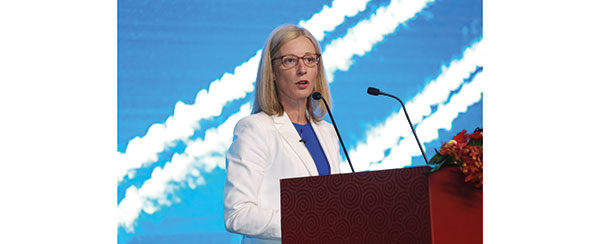
“Its resulting bottom line is essential for the overall economic sustainability of airports, since aeronautical revenues generated from aviation activities are not sufficient to cover the full costs of providing and operating airport infrastructure.”
Next up was Shanghai Airport Authority’s Qin who noted that there are big plans to develop and grow the city’s Hongqiao and Pudong gateways, particularly in terms of their retail offerings and customer service levels.
The first keynote address of the conference was delivered by Charles Chen, president of the China Duty Free Group, who focused on the key factors affecting the Chinese market, and the ways that the industry can adapt to better serve Chinese travellers in the future.
In terms of outbound passengers, said Chen, Chinese citizens travel more and spend more than any other nation and this pattern looks set to continue for the foreseeable future.
He noted that as China grows, the very nature of the Chinese traveller is changing, with the passenger dynamic becoming increasingly sophisticated and diverse. So much so, in fact, that he believed it was now impossible to simply split them into three different groups – the middle classes, Millennials and Generation Z.
Chen stated that the new breed of Chinese travellers is increasingly looking for innovative new experiences and brands.
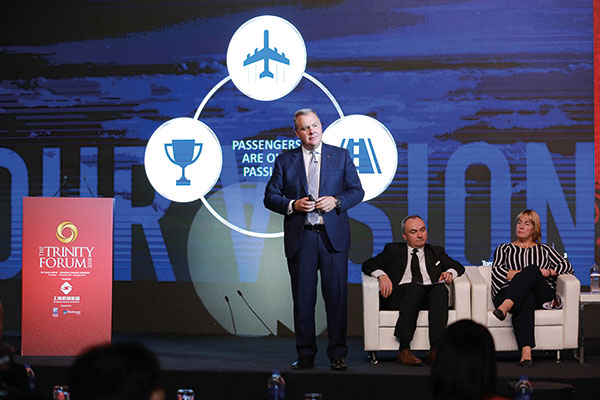
The next airport speaker on stage was Groupe ADP’s Daubert, who noted that today’s traveller was more health conscious, educated and aware than ever before and, as a result, were more interested in experiences and less convinced about the ‘bargains’ offered by duty free.
He revealed that Groupe ADP’s response has been to focus more on service, personalisation and experience than price. The strategy, he said, has seen it move away from the traditional approach to the layout and design of airport duty free offerings to one focused on Paris’s famous department stores.
And there is more to come at Charles de Gaulle and Orly airports as Daubert outlined plans to create 40,000sqm of new commercial space at the gateways over the next two years.
Sydney Airport’s Williams suggested that future innovation for airport duty free might be to take travel retail, and travel retail products, outside of the airport. He remarked: “Why be limited to three bottles of alcohol when, potentially, it’s possible to sell customers a case and have it shipped to them at home?”
Others making their mark on the first day included the always entertaining executive vice president of Dubai Duty Free, Colm McLoughlin; Tito’s Homemade Vodka managing director, John McDonnell; and Harrods International director, Raj Assanand.
Airport highlights of a whirlwind second day included Budapest Airport’s head of retail and advertising, Dr Patrick Bohl, discussing the gateway’s BARTA (brand, airline, technology, airport) campaign in a panel session titled ‘Towards a new retail and consumer experience’.
Auckland International Airport’s omnichannel manager, Jayne Wear, explained more about her airport’s ‘cross channel and connected experience’ approach to retail to appeal to the next generation of travellers.
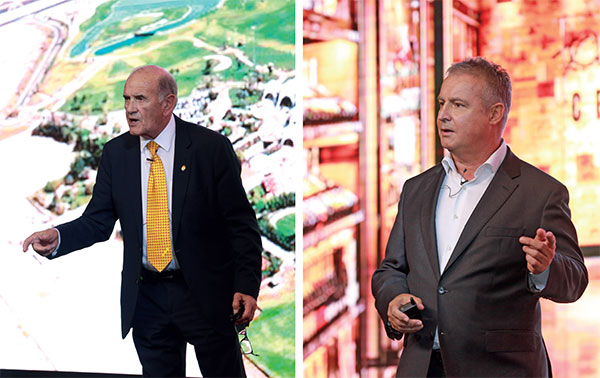
While ACI World’s Airport Service Quality (ASQ) associate director, Dimitri Coll, told the audience more about the organisation’s annual customer satisfaction survey and the commercial performance insights it provides that can help airports boost their retail and F&B revenues.
Day two also featured two big panel debates, ‘Destination 2030 – where are the next steps on the travel retail journey?’ and ‘Reimagining the airport commercial offer’.
Airport representatives taking part in the second panel included Manchester Airport Group’s executive vice president for business development and lounges, Beth Brewster; Greater Toronto Airport Authority’s vice president for customer service and terminal services, Scott Collier; and Central Japan International Airport’s president and CEO, Masanao Tomozoe.
Tomozoe shared his company’s vision of the future, which he revealed would be focused on championing excellent customer service and a people first approach. The goal, he said, was on creating engaging experiences – in retail and beyond – and creating ‘sense of place’.
“We have been doing lots of crazy things to attract as many people as possible,” laughed Tomozoe, as he shared photos of activations featuring characters such as Pikachu and Hello Kitty.

